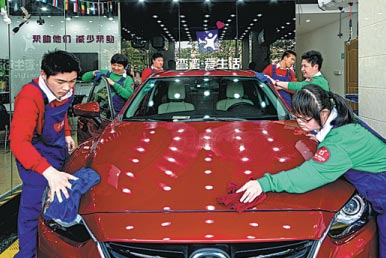Mentally impaired get a helping hand
 |
|
A car wash is one of the programs run by Wanwan Care Center. [Photo provided to China Daily] |
The center opened a bookstore, then a convenience store and then a car wash in the neighborhood, so that some of those with better skills can work as cashiers or help wash the cars.
Jin Yan, who teaches the patients to be cashiers at the center, says: "We didn't make it special from other stores.
"For those who came to our store for the first time, after they learned about our center, they were all supportive and waited for our children to finish the work."
Those who are still not capable of working in the stores make simple handicrafts, which are sold in the store.
"As more people in the neighboring communities get to know us, they become our patrons," Xu says proudly.
Speaking about the public response to the project, Xu says many government officials, company workers and university students from home and abroad help run the stores.
Some volunteers have even become full-time staff of the center, she says.
Zhuo Li gave up her work in an advertising company and came to the center earlier this year.
"I used to come once or twice a week as a volunteer, and gradually I have bonded with these 'children'-I miss them if I don't have the time to come," says Zhuo.
"The most beautiful thing of working here full time is being able to see them improve."
Yang Zhangliang, a car wash worker who joined the center, says: "I taught them how to wash a car, but they taught me how to be more patient.
"After acquiring the skill, they wash cars with great meticulousness."
But there are also failed programs. Xu once bought several sewing machines for stitching aprons, but it turned out that the skill was too difficult for disabled people.
What Xu hopes is that the model of Wanwan can be copied by others, so as to benefit more people with such disabilities.
Through her vocational programs, Xu wants not only to help the mentally impaired themselves, but also to correct public misconceptions about them.
"I want to break the stereotypical attitude toward disabled people-that all they need is people's sympathy and donations," she says.
"They need respect and self-esteem as well."
















